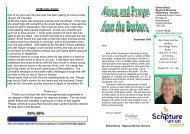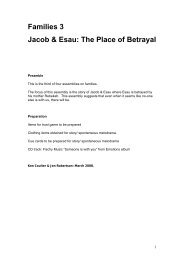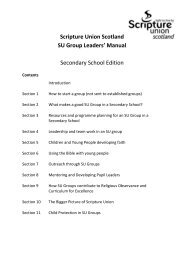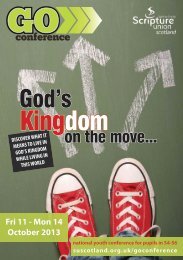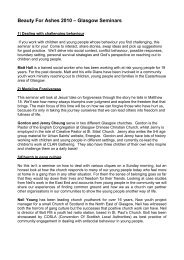How to start an SU Group - Scripture Union Scotland
How to start an SU Group - Scripture Union Scotland
How to start an SU Group - Scripture Union Scotland
You also want an ePaper? Increase the reach of your titles
YUMPU automatically turns print PDFs into web optimized ePapers that Google loves.
Team Leaders’ M<strong>an</strong>ual – School <strong>SU</strong> <strong>Group</strong>sSection 5Children <strong>an</strong>d Young people developing faithThe aims of this section are: To explore how children <strong>an</strong>d young people develop in underst<strong>an</strong>ding the Christi<strong>an</strong> faith To explore what triggers faith <strong>to</strong> grow <strong>an</strong>d how a Christi<strong>an</strong> group in schools c<strong>an</strong>encourage this growth.5.1 <strong>How</strong> do you see the state of children before God?In the Bible there are m<strong>an</strong>y different ways in which people come in<strong>to</strong> a believing faith. Over theyears as people have tried <strong>to</strong> ev<strong>an</strong>gelise children <strong>an</strong>d young people, different – <strong>an</strong>d sometimesopposing – points of view <strong>an</strong>d models have been used. Consider some of these positions listedbelow: All children <strong>start</strong> life outside the kingdom The presence of a Christi<strong>an</strong> parent establishes right st<strong>an</strong>ding before God The presence of a Christi<strong>an</strong> parent creates privilege not status All children belong <strong>to</strong> God All children will begin with God but will drift from that position unless effectiveev<strong>an</strong>gelism/ teaching occurs in their livesWhat we think about the state of the child before God will determine the methods we use inev<strong>an</strong>gelism. Considering these positions opens up the issue of how <strong>to</strong> work with integrity withchildren <strong>an</strong>d young people.5.2 Considering models of faith developmentThere are m<strong>an</strong>y ideas about how faith develops in a person. Here are two for you <strong>to</strong> consider withregard <strong>to</strong> your group.John H Westerhoff: (Will our Children have Faith?, Harrisburg, Morehouse, 2000) suggests that faithgrows in us rather like a tree going through stages <strong>an</strong>d adding rings rather th<strong>an</strong> a progression or ajourney.Experienced faith is the faith of the young child or the new Christi<strong>an</strong>. It is <strong>an</strong> experience ofGod <strong>an</strong>d of the people of God. Almost subconsciously people know about God but couldn’tarticulate this. Pre-school/ Early primaryAccepted faith is the faith of childhood where things are accepted <strong>an</strong>d believed. A strongsense of accept<strong>an</strong>ce <strong>an</strong>d belonging mark this stage.Searching faith is a stage where people are experimenting <strong>an</strong>d testing out a number ofoptions. Questioning <strong>an</strong>d doubting would be hallmarks of this stage.(This would be the stageof ‘belief’ most affirmed by our society at present where everyone is free <strong>to</strong> work out theirown thing)Integrated faith is the stage where belief is ‘mine’ not from my family of peer group. Anintegrated belief which integrates lifestyle, mind heart. Adult.Westerhoff is adam<strong>an</strong>t that people must go through the stages before adult, mature faith c<strong>an</strong> beexperienced, but you might find it more helpful <strong>to</strong> look at it presented in the following way:J<strong>an</strong>uary 2012







